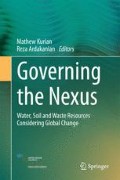Abstract
Global trends such as urbanization, demographic and climate change that are currently underway pose serious challenges to sustainable development and integrated resources management. The International Panel on Climate Change noted in 2007 that one key feature of these changes is an acceleration of the global hydro-cycle. This is manifested in the increasing frequency or severity of extreme events such as floods and droughts. Since water is a potent dissolver and transport agent of soils, nutrients, other chemicals and materials and wastes may ‘migrate’ with water and could be ‘lost’ in unwanted places such as oceans, which may make recycling unfeasible with technologies that are available today. The ‘volatility’ of water resources needs to be accounted for given an increasing demand for food production. At the same time, there is a growing concern about soil degradation and the decline in soil quality, while the demand for food is going to increase. In this context, environmental quality can be satisfied only if soil, waste and water resources are managed in a sustainable and integrated manner. Given the limitations of the conventional technology transfer model in terms of addressing environmental challenges it is now acknowledged that capacity development approaches that aim to facilitate technology adaptation may offer a better chance of success.
Access this chapter
Tax calculation will be finalised at checkout
Purchases are for personal use only
Notes
- 1.
Livelihood risks could relate to access to income, employment, food and services (eg. water supply, ecosystem services).
References
Hoff, H. (2011). Understanding the nexus. Background paper for the Bonn 2011 conference: The water, energy and food security nexus. Stockholm: Stockholm Environment Institute.
Kurian, M. (2010b). Institutions and economic development-Introduction. In M. Kurian & P. Carney (Eds.), Peri-urban water and sanitation services: Policy, planning and method. Dordrecht: Springer.
Kurian, M. & Ardakanian R. (2014). Institutional arrangements and governance structures that advance the nexus approach to management of environmental resources. In Advancing the nexus approach to the sustainable management of water, soil and waste—White Book. Dresden: UNU-FLORES.
Lal, R. (2013). The Nexus of soil, water and waste. Lecture Series No.1. Dresden: UNU-FLORES.
Schonberger, V. M., & Cuker, K. (2013). Big data: A revolution that will transform how we live, work and think. UK: John Murray.
Author information
Authors and Affiliations
Corresponding author
Editor information
Editors and Affiliations
Rights and permissions
Copyright information
© 2015 Springer International Publishing Switzerland
About this chapter
Cite this chapter
Kurian, M., Ardakanian, R. (2015). The Nexus Approach to Governance of Environmental Resources Considering Global Change. In: Kurian, M., Ardakanian, R. (eds) Governing the Nexus. Springer, Cham. https://doi.org/10.1007/978-3-319-05747-7_1
Download citation
DOI: https://doi.org/10.1007/978-3-319-05747-7_1
Published:
Publisher Name: Springer, Cham
Print ISBN: 978-3-319-05746-0
Online ISBN: 978-3-319-05747-7
eBook Packages: Earth and Environmental ScienceEarth and Environmental Science (R0)

